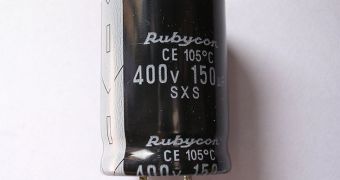Back in 2000, Case Western Reserve University (CWRU) professor of materials science and engineering Gerhard Welsch proposed an idea for a revolutionary type of capacitor that was way ahead of its time. Now, need has caught up the world of ideas, and the prototype is getting a lot of attention.
Manufacturers of hybrid cars, computer power supplies, pacemakers and portable devices, among others, are now in a rush to develop, or sponsor the development of advanced power supplies that are light, powerful, small and also reliable.
The idea that Welsch had ten years ago combined all those traits into a single, innovative type of capacitor, that could be used for a variety of practical applications.
Now, with fresh funding, the CWRU expert is setting his idea into practice. He believes that a device to meet the aforementioned specifications could be ready within three years.
The scientist is now conducting his work sponsored by a $2.25 million stimulus grant provided by the Advanced Research Projects Agency – Energy (ARPA-E), a division of the US Department of Energy.
CWRU professor of computer science and electrical engineering Frank Merat and professor of chemical engineering Chung-Chiun Liu are also involved in the research effort.
Perhaps the main application that the new capacitors will have will be in hybrids and all-electric cars. ARPA-E is very interested in making such vehicles able to compete with gas/diesel-fueled cars.
Unlike batteries, capacitors can absorb and release energy at tremendously high rates. This is first and foremost done by converting DC electricity into high frequency AC power, via the use of capacitor-enabled power inverters,.
“Electric vehicles need power inverters to convert battery power into higher voltage AC power for their electric motors and to harvest braking power,” Welsch explains.
“A capacitor is the equivalent of an electron pressure tank, and the trick is to make the dielectric film (or the wall of the pressure tank), impenetrable to electrons by making it strong and as perfect as possible,” he adds.
“Perfect is not possible, but we can make a material that’s close,” the expert goes on to say.
At this point, the professor and his group are also studying the possibility of developing miniaturized implantable defibrillators based on the new technology.
The group believes that this is just the tip of the iceberg of what can be done with the advanced capacitors, once the technology is fully matured.

 14 DAY TRIAL //
14 DAY TRIAL //